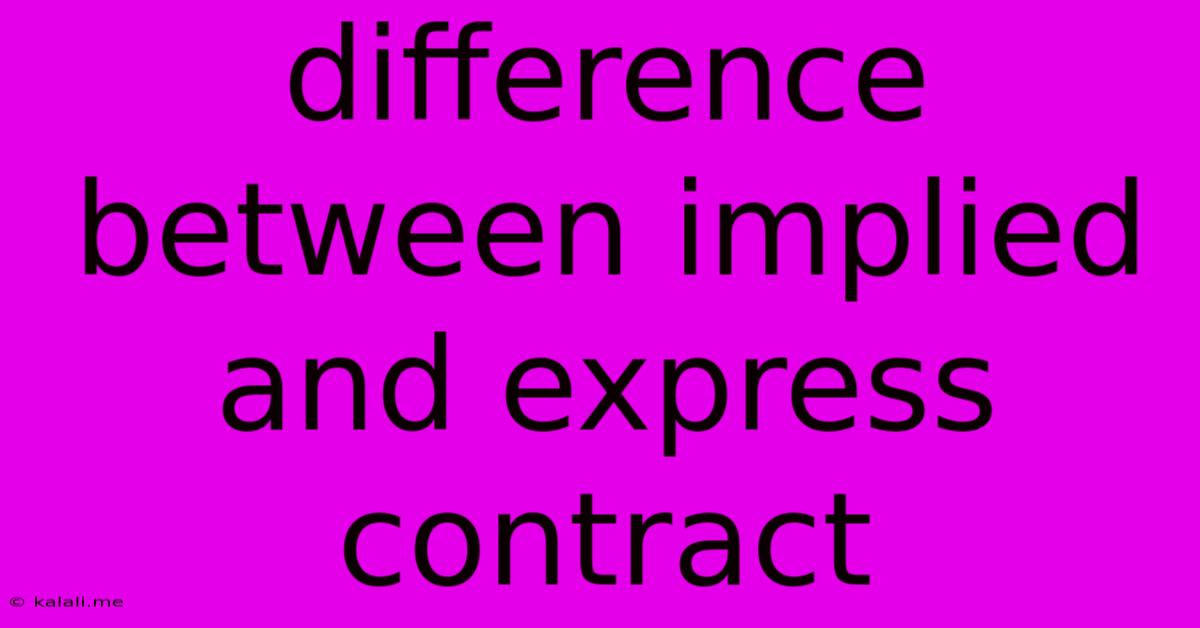Difference Between Implied And Express Contract
Kalali
Jun 14, 2025 · 3 min read

Table of Contents
The Key Differences Between Implied and Express Contracts
Understanding the difference between implied and express contracts is crucial for anyone involved in business or legal matters. Both create legally binding agreements, but they differ significantly in how those agreements are formed. This article will explore the nuances of each, highlighting key distinctions and providing practical examples. Knowing the type of contract you're dealing with can significantly impact your rights and obligations.
What is an Express Contract?
An express contract is a straightforward agreement where the terms are explicitly stated, either orally or in writing. This leaves little room for ambiguity. The offer, acceptance, and consideration are clearly defined and communicated between the parties involved. Think of a signed lease agreement, a written sales contract, or even a verbal agreement where the terms are explicitly discussed and agreed upon. Key characteristics include:
- Clear and unambiguous terms: All essential elements are explicitly stated.
- Evidence of agreement: Written documentation or a clear record of the verbal agreement exists.
- Mutual understanding: Both parties fully understand and agree to the terms.
Examples of Express Contracts:
- A signed employment contract: This outlines the employee's responsibilities, salary, benefits, and termination clause.
- A purchase agreement for a car: This specifies the make, model, price, and payment terms.
- A written service contract: This details the services to be provided, payment schedule, and timelines.
What is an Implied Contract?
An implied contract, also known as an implied-in-fact contract, is a bit more subtle. It's an agreement where the terms aren't explicitly stated but are inferred from the conduct or actions of the parties involved. The existence of the contract is implied from the circumstances surrounding the transaction. The key here is that both parties act in a way that suggests they have an agreement, even without a formal declaration.
- Conduct implies agreement: The parties' actions demonstrate a mutual understanding and intent to be bound by a contract.
- Reasonable expectation of payment: One party provides services or goods with the reasonable expectation of payment, and the other party accepts those services or goods.
- Absence of formal agreement: There's no explicit written or verbal agreement outlining the terms.
Examples of Implied Contracts:
- Ordering food at a restaurant: By sitting down, ordering food, and consuming it, you implicitly agree to pay the bill.
- Hiring a plumber to fix a leak: The plumber fixes the leak, and you implicitly agree to pay for their services based on their usual rates or a previously discussed price.
- Regularly purchasing goods from a supplier: Continued purchases and acceptance of goods over time can imply an ongoing contract.
Key Differences Summarized:
| Feature | Express Contract | Implied Contract |
|---|---|---|
| Formation | Explicitly stated, oral or written | Inferred from conduct and circumstances |
| Terms | Clearly defined and communicated | Implied from the parties' actions |
| Evidence | Written documentation or clear verbal record | Circumstances and conduct |
| Ambiguity | Less prone to ambiguity | More prone to ambiguity |
| Enforcement | Easier to enforce | Can be more challenging to enforce |
Conclusion:
Both express and implied contracts are legally binding. Understanding the distinctions between them is crucial for effective business dealings and conflict resolution. While express contracts offer clarity and easily verifiable terms, implied contracts rely on interpretation of conduct and circumstances. Seeking legal counsel is advisable when dealing with complex contractual situations, especially those that involve implied contracts due to the higher potential for ambiguity and challenges during enforcement.
Latest Posts
Latest Posts
-
What Is Considered The First Step When Conducting Experimental Research
Jun 14, 2025
-
How Many Factors Does 21 Have
Jun 14, 2025
-
Stress Strain Curve For Cast Iron
Jun 14, 2025
-
Which Of The Following Is An Abiotic Factor
Jun 14, 2025
-
What Process Destroys All Microbial Life Including Spores
Jun 14, 2025
Related Post
Thank you for visiting our website which covers about Difference Between Implied And Express Contract . We hope the information provided has been useful to you. Feel free to contact us if you have any questions or need further assistance. See you next time and don't miss to bookmark.